

 The South African
The South African
Gorelik specialises in the history of Russian-South African contacts and Russian perceptions of South Africa. He edited the South African Military History Society publication of Yevgeny Avgustus’s memoir A Russian Fighting for the Boer Cause (2016).
In 1901, a provincial Russian newspaper published a scandalous interview with a Russian who had just returned from the Transvaal. He stated that Russian volunteers traded their horses, which they had received from the Boer authorities, for drink money. Among other things, the interviewee alleged that his compatriots later commandeered cab horses in Boer cities by cutting the traces off the harness (See Avgustus, March 1902, p 217).
The allegations were refuted by Yevgeny Avgustus, who had served in the Russian Corps(1), and even by Yevgeny Maximov, who had vied for leadership of that unit (Avgustus, March 1902, p 218–219). However, the story was carried by the press in the United Kingdom, omitting the rebuttals and denigrating the character of Russian volunteers. The British public was told that ‘the Russians were never in the front of an attack or defensive action’. Ostensibly, the volunteers disgraced themselves, the Boers rejected their services and even their commandant, Alexey Ganetsky, abandoned them in disgust (London Daily News; ‘Around the world’).
At the time, this story filled the needs of the British wartime propaganda, which presented foreign volunteers on the Boer side as Anglophobe adventurers. Yet even now, the reputation of the Russian Corps remains tainted. Some members of the Russian Corps also criticised their unit. ‘My memories of everything that we experienced are still too fresh, and these memories are mostly sad and gloomy rather than pleasant’, wrote Second Lieutenant Yevgeny Avgustus (Avgustus, March 1902, p 217). Discussing his time in the Russian Corps put him off so much that he never finished his war memoir. A negative view of that unit was entrenched after the publication of a book by Sophia Izedinova, a nurse with the Russo-Dutch Ambulance, in English translation (Izedinova, 1977). In her opinion, the Corps played ‘a prominent but unenviable role among the European units’, bringing their country and Russian volunteers into disrepute (Izedinova, 1903, p195).
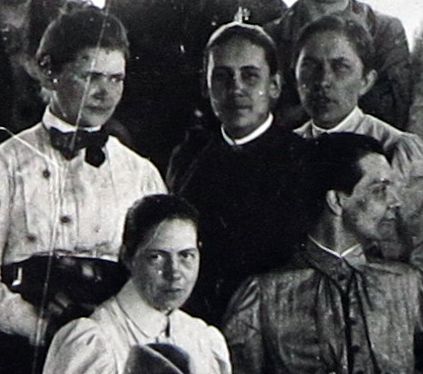
The Russian nurses with the Russian-Dutch Ambulance.
Sophie Izedinova might be at bottom row left
Davidson and Filatova, in their seminal study of Russian participation in the Anglo- Boer War, concluded that the Russian Corps was ‘fairly typical’ of foreign volunteer units with their rowdiness, infighting and loose discipline, on the one hand, and bravery, comradeship and dedication, on the other (Davidson and Filatova, 1998, pp 108–109). Indeed, remarks by other memoirists about the Russian Corps were positive, even complimentary. Such views have largely been ignored in the Boer War literature — unlike the unproven allegation that Ganetsky refused to admit Jews (in fact, the unit had two Jewish founding members) (Cammack, 1990, p 55; Davidson and Filatova, 1998, p 107).
A balanced analysis of data from various sources, both Russian and international, including Ganestky’s admirers and censurers, helps to evaluate the contribution of the Russian Corps to the republican cause and to understand the ambiguities of its brief existence.
A well-known personage
The future commandant of the Russian Corps was ‘a well-known personage’ in Russian society (‘Russian Boer officers’). In the early 1890s, Alexey Ganetsky left active duty as a dragoon officer at a Guards regiment to become an assistant to the Minister of War (Anglo-burskaya voina 1899–1902 godov, vol 8, 2012, p 16). A son of an illustrious general, he married a rich divorcee and rebuilt the Sandunovsky Bathsasa palatial structure for the business and cultural elite of Moscow with state-of-the-art equipment and 400 strong personnel. The Russian and the European press covered his departure for Africa to ‘place his sword at General Joubert’s service’ (‘Paris day by day’;‘Otyezd v Transvaal’). According to a report presented to the Tsar, Ganetsky was a reserve second captain (stabs-rotmistr) (Anglo-burskaya voina 1899–1902 godov, vol 8, 2012, p81).
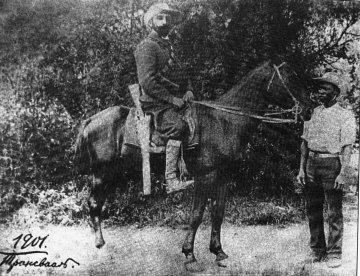
Alexey Ganetsky
He had conceived the idea of forming a Russian volunteer unit under his command before his arrival in the Transvaal. On the ship to Southern Africa, Ganetsky met Lieutenant Colonel Yevgeny Maximov and shared his plan, only to realise that his compatriot had the same ambition. Afterwards, Maximov maintained that Ganetsky had promised to renounce his claim to leadership of the future unit if there was someone more deserving; Ganetsky vehemently denied it (Avgustus, March 1902, pp 216–217).
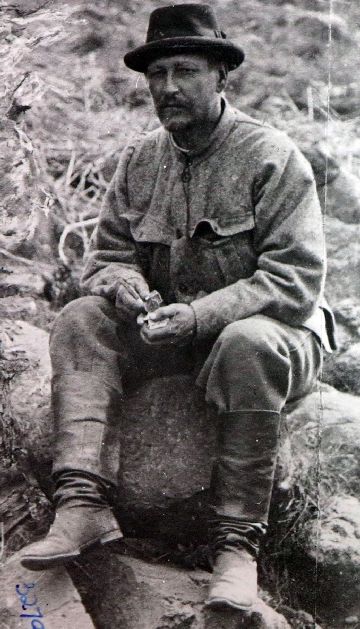
Yevgeny “Eugene” Maximov
By ‘more deserving’ Maximov meant an officer like himself. In that war, the 50-year- old officer was the most senior Russian volunteer in terms of age and military rank. A veteran of the Herzegovina uprising, Serbian-Turkish and Russo- Turkish wars and the Russian conquest of Turkestan, he had broad experience in guerrilla warfare and commanding volunteer units (Angloburskaya voina 1899–1902 godov, vol 6, 2012, pp 64–72, 80; Avgustus, January 1902, p 25). Maximov went to the Transvaal as both a war correspondent and military observer. With his travel expenses met by the Russian Ministry of War, Maximov sent his reports from the Boer republics to the General Staff in Saint Petersburg. He probably had a secret task from the Ministry (Voropayeva, Vyatkina and Shubin, 2001, p 514; Davidson and Filatova, 1998, p 85).
In late February 1900, Maximov and Ganetsky began to organise a Russian Corps in Pretoria to conduct raids behind the enemy lines. Ganetsky seemed to be willing to become his lieutenant and visited top government officials who promised to provide equipment for the future unit (Anglo-burskayavoina 1899–1902 godov, vol 6, 2012, p 3).
In early March, Ganetsky travelled to Glencoe, where Commander-in-Chief Piet Joubert had established his headquarters after the retreat from Ladysmith. Russian volunteers also gathered in that town, and Ganetsky tried to recruit them. Although he had not yet participated in this war, he was elected to be commandant of the newly founded Russian Corps as a senior officer among his compatriots at Glencoe and the idea’s originator. The nomination of the charming and enthusiastic newcomer was supported even by those who had fought on Spion Kop and the Thukela Heights.
Language Issues
The Russians spoke only basic Dutch; they often found it hard to communicate, which was annoying in the camp and dangerous on the battlefield. In their memoirs, Russian volunteers seldom mentioned their Boer brothers-in-arms by name, unless those were officers, who apparently knew French or German and could keep up a conversation with them. In addition, some of the Boer tactics and methods as well as their unprofessionalism in military matters did not sit well with the Russian officers who served as rank and file (Davidson and Filatova, 1998, p 104).
‘We had experienced, endured and pondered much in the trenches over the muddy Tugela’, recounted Avgustus. ‘We learnt that neither the republican valour nor the selfless bravery and courage of individuals can compensate for the lack of military organisation and discipline. Now we had an opportunity to set an example of proper organisation for the Boers.’ (Avgustus, September 1901, p 889).
Apart from Ganetsky and Avgustus, three Russian soldiers joined the Corps from the beginning: Reserve Ensign Alexey Diatroptov (who had been a member of the Krugersdorp commando together with Avgustus), Second Captain Alexander Shulzhenko and a reserve dragoon, Private Leiba Karnan (Kaplan?). Other Russian-born founders included men from the Baltic provinces: Baron Von Busch; a high-school student Grunstein from Libau; and seven Polish and Lithuanian immigrants who had been miners, artisans and shop owners in the Transvaal before the war. Avgustus was elected as their corporal.
There were also Portuguese and Italians, led by Camillo Cornetti, a former Bersaglieri warrant officer, who had fought under Ricciotti Garibaldi with the Greek Army against Turkey in 1897. Shulzhenko was put in charge of the group of Greeks, who had deserted from the US Army in Cuba. A Prussian lieutenant Döseler and a retired French dragoon officer, Jean du Breuil de Saint-Germain completed the line-up (Avgustus, September 1901, p 887–889; January 1902, pp 11–16).
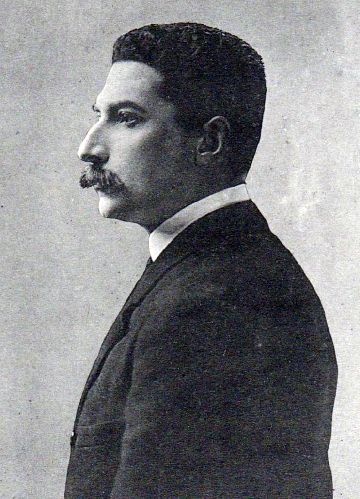
Jean du Breuilde Saint-Germain
Having received permission to form the unit from Joubert, Ganetsky and his associates left for Pretoria to procure horses, weapons, ammunition and other equipment for their Corps. During their stay in the capital, they met Maximov, who demanded that Ganetsky relinquish command of the unit in his favour. But the second captain refused to obey the lieutenant colonel, backed by the other founding members.
Maximov had not yet had an opportunity to prove his ability to organise, inspire and lead his men on the battlefield in Africa. He was known in the Transvaal mainly as a journalist and sharp shot. It was not enough to persuade his compatriots, who had taken part in some of the bloodiest battles of that war, that he should replace Ganetsky.
An important discovery
Besides, the Russians found out that Maximov had been a policeman. Indeed, he was made a lieutenant colonel while serving in the Special Corps of Gendarmes, the uniformed security police of the Imperial Russian Army. This and his close relations with Boer leaders suggested that he was on a mission from the Russian government: members of the Russian Corps believed that Maximov spied on his compatriots. Their assumption was incorrect because he had resigned from the security police long before (Voropayeva, Vyatkina and Shubin, 2001, p 514; Avgustus, January 1902, p 22). However, Maximov had no chance of becoming the leader of the Russian Corps, because its members resented the prospect of being commanded by an ‘undercover agent’.
Ganetsky and his companions returned to Natal. Soon after their arrival, on 17–18 March, Maximov came to Glencoe, tried to reason with them and was rejected again. The matter seemed to be settled.
Deployment
In late March, the new Commander-in- Chief, General Louis Botha, ordered the Russian Corps to proceed to Kroonstad in the Orange Free State, half a thousand kilometres west of Glencoe, where the units of foreign volunteers were to become part of the Foreign Legion. It was a brainchild of George de Villebois-Mareuil, a retired French colonel and veteran of European and colonial wars, who had been given the rank of general in the Boer forces. When Maximov, the second most senior foreign officer on the Boer side, met him in Kroonstad on 23 March, Villebois invited him to be his second in command (Izedinova, 1903, p 199). Maximov accepted the proposal: the new position matched his ambition and experience.
By the time the Russian unit reached Kroonstad, Villebois had entrusted the legion to the Russian deputy and departed with his trusted men to make raids near Kimberley (Macnab, 1975, p 180). The Russians refused to join the legion: they had not changed their minds about Maximov and did not want to follow his orders.They spread rumours about him, which he was unable to dispel, having no one to vouch for him. A French volunteer Henri-Marie-Albert Lecoy de la Marche recounted that Maximov’s compatriots ‘could not pardon his position as a police officer and even professed a certain contempt for him.’ (Lecoy de la Marche, 1901, pp 25–26) Their attitude was imparted to other foreign volunteers strengthening their opposition to Maximov (Davitt, 1902, pp 334–335).
The defiant Corps put itself at the disposal of General Philip Botha south of Brandfort. New Russian volunteers augmented their ranks: Vladimir Roubanov and Vladimir Semyonov, graduates of the Saint Petersburg Institute of Civil Engineers; second lieutenants Ivan Nikitin and Prince Mikhail Yengalichev. The average size of the unit in April can be conservatively estimated at 25–30 members.
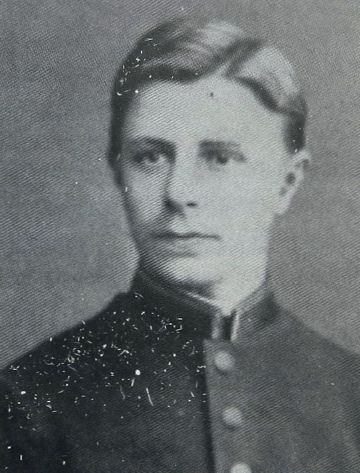
Vladimir Semyonov
Maximov was unable to resolve conflicts among his subordinates in Kroonstad and moved his units southwards. After Villebois was killed by the British on 5 April, resistance to Maximov started to grow (Izedinova, 1903, pp 208, 210; Vinogradsky, 1902 , p 233; Davidson and Filatova, 1998, p 75). Eventually, only the Dutch Corps remained under his command, comparable to the Russian Corps in size.
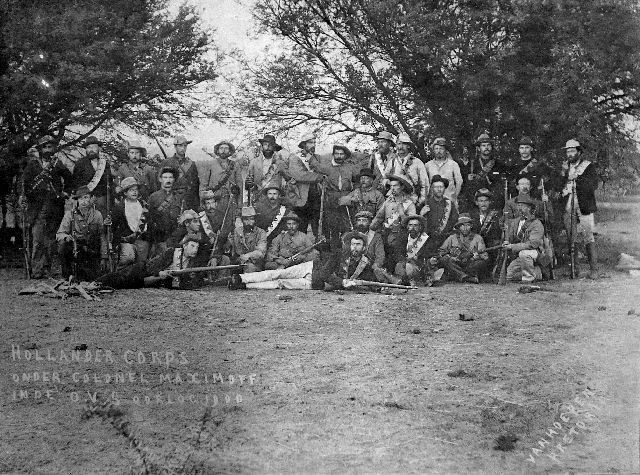
The Dutch Corps under Maximov’s command. April 1900
Many rebukes about Ganetsky were apparently justified. He was characterised as a vain poseur, whose cunning prevented a stronger leader, Maximov, from taking over the Russian Corps (Anglo-burskaya voina 1899–1902 go-dov, vol 6, 2012, pp 10–11; Avgustus, March 1902, pp 216–217). But Izedinova wrongly accused Ganetsky of shirking his duty, arguing that the Russian Corps ‘acquired greater fame for its excesses in towns and camps than for feats on the battlefield, although it could not avoid making two appearances at the front line’ (Izedinova, 1903, p 111). This implied that Ganetsky and his men evaded engagements with the enemy.
On the contrary, those who knew Ganetsky personally or served under him in that war praised his courage and dedication to the republican cause. Lieutenant Feodor Guchkov commended Ganetsky for his valour (Anglo-burskaya voina 1899–1902 godov, vol 8, 2012, p 42). Yengalichev recounted that his commanding officer carried the wounded on his back under enemy fire (Angloburskaya voina 1899–1902 godov, vol 7, 2012, p 395). A French volunteer told a Russian military observer that Ganetsky ‘amazed everyone with his courage’ (Davidson and Filatova, 1998, p 109). Dr Vladimir Kukharenko opined that Ganetsky’s Russian Corps did useful work for the Boers. When the doctor and others among Izedionova’s colleagues at the Russo-Dutch Ambulance saw an article announcing that Ganetsky had been killed in action, they ‘all read it with regret’ and were relieved when the news proved to be a mistake (Anglo-burskaya voina 1899– 1902 godov, vol 10, 2012, p 14).
Izedinova asserted that the Russian unit pitched their tents between the Russian Red Cross and the Dutch hospitals at Glencoe rather than close to the enemy. According to her book, their carousing annoyed the patients and medical personnel who complained to the military authorities.
However, I found no criticisms of the Russian Corps in the published reports, articles and other statements by the Red Cross Ambulance personnel. Furthermore, the doctor in charge of the Russian hospital at Glencoe noted that the Russian Corps was based at a distance, together with the Boer and foreign volunteer units, and expressed no complaints about their behaviour in his report (Anglo-burskaya voina 1899–1902 godov, vol 9, 2012, p 161).
In Natal, the Russian Corps reconnoitred between the British patrols and the Sundays River, north of Ladysmith (‘Russian scouts’). They did not take part in major engagements with the enemy because the unit was transferred to Kroonstad before the Boers began their offensive from Glencoe.
Until late April, the Russian Corps camped south of Brandfort, carrying out raids and reconnaissance in the direction of Bloemfontein in coordination with General Botha. Members of the Corps recounted that, despite Ganetsky’s eagerness to engage with the stalling enemy, they spent most of their time in idleness. They blamed it on Botha’s ‘indecisiveness’ (Anglo-burskaya voina 1899–1902 godov, vol 7, 2012, pp 382–383; Roubanov, 1900, pp 40–41).
A War Correspondent’s View
Michael Davitt, an Irish politician and war
correspondent on the Boer side, witnessed
the work of Russian scouts in that area. He
recounted:
“On one occasion, three of them actually
penetrated into the British lines near
Bloemfontein and returned with a most
accurate plan of Roberts’ great encampment
near the Free State capital. Philip Botha, who
was himself an ideal chief of scouts and
Christian de Wet’s right-hand man during his
most successful enterprises in the Free
State, had a very high opinion of his Russian
pupils and placed great confidence in their
reports.” (Davitt, 1902, pp 334–335)
Sometimes, the Russian Corps engaged the enemy. On Ganetsky’s suggestion, Botha sent the unit with another 200 men to challenge the British. The Corps approached the enemy and opened fire, but the British remained in the trenches. After a three-hour exchange of shots, the Russian unit returned to the camp (Anglo-burskaya voina 1899– 1902 godov, vol 7, 2012, p 384; Roubanov, 1900, pp 43–44). However, the day was marred by an accident: Maximov’s Dutch Corps and Boer units appeared on their side and started shooting, having mistaken them for the enemy. The Russian Corps returned fire. Before they realised their error, the Russians wounded a Boer soldier in the leg (Anglo-burskaya voina 1899–1902 godov, vol 7, 2012, pp 377–378, 384).
Another time, Maximov volunteered to capture British outposts on the hills around a farm and cut the railway line. Botha’s men were supposed to take the nearest hill to cover the assault. According to Izedinova, Botha did not to do his part, and the attempt was foiled (Davidson and Filatova, 1998, p 76). However, members of the Russian Corps related this story differently. On the night of 12 April, they occupied the farm and the hill with Botha’s troops, but their ambush was discovered, and a British cavalry regiment was sent after them. The Russian Corps managed to escape having lost one member, an Italian, who was killed (Anglo-burskaya voina 1899– 1902 godov, vol 7, 2012, pp 379–380, 384; D’Etechegoyen, 1901, p 122).
The Russian unit remained south of Brandfort for nearly a month, and the inaction was demoralising. According to Maximov, there were complaints about the low moral standards of the ‘multiethnic rabble’ who exceeded Russians in that unit (Quoted in Avgustus, March 1902, pp 218–219).
In fairness, it must be said that Maximov’s Dutch Corps was not always well-behaved either, despite the commandant’s efforts to keep it in check. According to Maximov’s subordinate, ‘there was not much order in the (Dutch) camp, it was a gang of real daredevils — a fighting unit.’ (Plokhooy, 1901, p 105). His description of their camp life resembles common criticisms of the Russian Corps: whenever they did not fight the enemy, they fought among themselves. The Dutch volunteers also engaged in looting on both sides of the front line, while Maximov shut his eyes to it if they shared their ‘booty’ with him (Plokhooy, 1901, p 109).
Seeing the Russian Corps crumble, Ganetsky ordered his men to move to the western front, towards Fourteen Streams, where intermittent fighting was taking place (Novosti Dnya). Izedinova reported that he did it on Botha’s insistence because the Boer general could not stand the debauched unit (Izedinova, 1903, p 111). However, Avgustus and Yengalichev deny that Botha was displeased with their Corps (Anglo-burskaya voina 1899–1902 godov, vol 7, 2012, p 384; Avgustus, March 1902, pp 216–217).
Ironically, after the Russians left, skirmishes with the British intensified which resulted in serious fighting. When Ganetsky and his men reached Johannesburg, he read his own obituary in a newspaper: it was announced that the Russian captain had been killed in action on 30 April (Pottinger, 1986, p 280). Evidently, the journalists confused Ganetsky with Maximov, who displayed dauntless courage and sustained severe wounds when the Dutch Corps under his command held the Tobaberg hill, defending the road to the Boer position at Houtnek. It was the highlight of the Russian officer’s career with the Boer forces, which at last earned him the respect of Boer soldiers and foreign volunteers. Maximov became the second foreigner after Villebois to be awarded a general’s rank by the Boers.
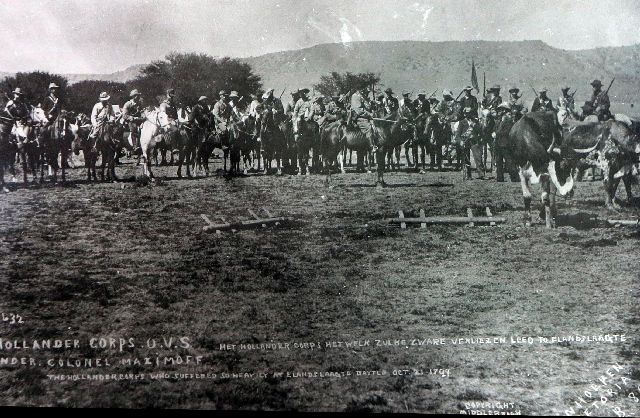
The Dutch Corps under Maximov’s Command,
April 1900. Photographed in Free State.
In Pretoria and Johannesburg, the Russian Corps unit obtained equipment and ammunition, but their morale was so low that their own men stole their horses. Meanwhile, on 3 May, the British resumed their advance and captured Brandfort. The Russians were ordered to return and help to delay the progress of the British troops (Anglo-burskaya voina 1899–1902 godov, vol 7, 2012, p 385). At that point, the unit disbanded because of a disagreement between the commandant and his men. Ganetsky and Shulzhenko went back to Kroonstad while Avgustus, Yengalichev, Nikitin and Diatroptov proceeded westwards with the Johannesburg Police commando.
Ganetsky took part in the fighting for Kroonstad on 12 May. Izedinova conceded that he had arrived just in time, but she also affirmed that ‘he failed to distinguish himself, and that was the end of his military career in the Transvaal’ (Izedinova, 1903, p 111). In fact, Ganetsky fought for another several weeks as member of Theron’s Reconnaissance Corps (Anglo-burskaya voina 1899–1902 godov, vol 8, 2012, p 21).
Although the Russian Corps never participated in anything bigger than a skirmish, they sought engagement with the enemy. It was just their luck that they were transferred from Natal before the Boer led their offensive from Glencoe and when they left shortly before the British recommenced their advancement from Bloemfontein after a month of stalling.
Maximov predicted that sensible Russian volunteers would be disappointed in their commandant. Indeed, some members of the Corps felt that they wasted their time in Ganetsky’s unit (Anglo-burskaya voina 1899–1902 godov, vol 6, 2012, pp 10–11). With hindsight, Avgustus admitted that Maximov fully deserved to command the Russian Corps (Avgustus, March 1902, pp 216–217). Ganetsky and the other Russians not only misjudged Maximov; they discredited him, which was a reason for the Foreign Legion’s demise. Unable to rely on his compatriots, Maximov commanded the Dutch Corps and demonstrated his valour and leadership on the battlefield.
Reflecting on the possibilities that the Russian volunteers could have done better under Maximov’s command, Avgustus noted: ‘If only they could have a capable leader, who, by the power of his authority, his personal charm, could inspire this motley crew with a sense of duty, camaraderie and mutual support — in the hands of such a leader, this rough and tumble would be transformed into a formidable force.’ (Avgustus, January 1902, p 16).
Despite the founders’ intentions, the unit failed to ‘set an example of proper organisation for the Boers’. Yet the Russian Corps was not an embarrassment but a missed opportunity.
Bibliography
Anglo-burskaya voina 1899–1902 godovglazamirossiyskihpoddannyh (The Anglo- Boer War of 1899–1902 as Seen by Russian Subjects) (Moscow, Izdatel I B Belyi, 2012).
‘Around the world’, The Navy and Army Illustrated, vol XII, 27 April 1901, p 127.
Avgustus, Y, ‘Vospominaniy-auchast-nika anglo-burskoyvoyny 1899–1900 gg.’(A memoir of the Anglo-Boer War in 1899–1900), Varshavsky Voyenny Zhurnal, 1901–1902.
Cammack, D, The Rand at War 1899-1902. The Witwatersrand and the Anglo-Boer War (London, James Currey; Berkeley and Los Angeles, University of California Press; Pietermaritzburg, University of Natal Press, 1990)
D’Etechegoyen, O, Ten Months in the Field with the Boers (London, Heinemann, 1901).
Davidson, A; Filatova, I, The Russians and the Anglo-Boer War, 1899-1902 (Cape Town, Human & Rousseau, 1998).
Davitt, M, The Boer Fight for Freedom (NY; London, Funk & Wagnalls, 1902).
Izedinova, S A, A Few Months with the Boers: The War Reminiscences of a Russian Nursing Sister. Johannesburg: Perskor Publications, 1977.
Izedinova, S V, Neskolskomesyatsev u burov: vospominaniyasestrymiloserdiya (A Few Months with the Boers: A Nurse’s Memoir) (Saint Petersburg, Tipografiya A S Souvorina, 1903).
Lecoy de La Marche, H-M-A, Souvenirs de la guerre du Transvaal: journal d’un volontaire (mars-septembre 1900) (Paris, A Colin, 1901).
London Daily Mail, 13 March 1901, p 5.
Macnab, RM, The French Colonel: Villebois-Mareuil and the Boers, 1899–1900 (Cape Town, Oxford University Press, 1975).
Novosti Dnya, 31 May (13 June) 1900, No 6114, p 2.
‘Otyezd v Transvaal’, Peterburgskaya Gazeta, 19 December 1899. ? 347.
‘Paris day by day’, The Daily Telegraph, 9 November 1899, p 11.
Plokhooy, C, Met den mauser. Persoonlike-ervaringen in den Zuid- Afrikaanschenoorlog (Gorinchem, F Duym, 1901).
Pottinger, B, The Foreign Volunteers: They Fought for the Boers (1899–1902) (Johannesburg, Scripta Africana, 1986).
Roubanov, V, Ot Peterburga do Pretorii (From Petersburg to Pretoria) (Saint Petersburg, Tipografiyazhurnala Stroitel, 1900).
‘Russian Boer officers’, Daily Mail, 23 November 1899, p 4.
‘Russian scouts’, Morning Post (London), 30 March 1900, p 5.
Vinogradsky, A, Anglo-burskaya voina v Yuzhnoy Afrike (The Anglo-Boer War in South Africa). Part 2 (Saint Petersburg, Ekonomicheskayatipo-litografiya, 1902).
Voropayeva, N G; Vyatkina, R R, Shubin, G V (Comp), Anglo-burskaya voina, 1899–1902 Gg.: Po arkhivnim materialam i vospominaniyam ochevidtsev (Anglo-Boer War, 1899–1902: Memoirs and Archival Materials) (Moscow, Vostochnaya Literatura, 2001).
Note: [1] In Russian literature, this unit is known as otryad, which means ‘troop’ or ‘detachment’, though none of these English words seems appropriate in this context. Its members as well as Yevgeny Maximov, who conceived the idea of a separate Russian unit, and Lieutenant Colonel Vasily Gurko, the Russian official military agent with the Boer armies, referred to it as ‘Corps’ (korpus). The unit of a similar size that Maximov organised later with Dutch volunteers was also called a Corps. Therefore, this word is used in this paper instead of ‘commando’ or other options [See Anglo-Burskaya voina 1899–1902 godov, 2012, vol 5, p 314; vol 6, p 3; vol 7, pp 12, 395– 396].
Return to Journal Index OR Society's Home page
South African Military History Society / scribe@samilitaryhistory.org